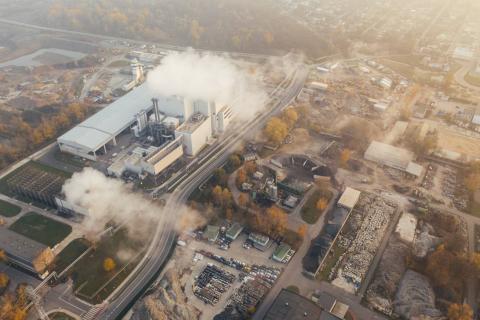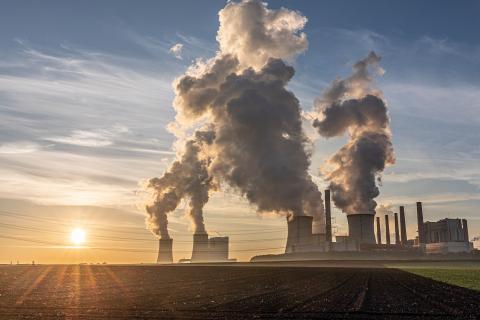Reactions: 50% chance of warming exceeding 1.5°C within seven years
At the current level of emissions, there is a 50% chance that global temperatures will exceed the 1.5°C target consistently over seven years. This is one of the forecasts in the Global Carbon Budget 2023 report, which estimates that CO2 emissions from fossil fuels will reach record highs in 2023, reaching 36.8 billion tonnes, 1.1 % more than in 2022. The report, published in the journal Earth System Science Data, shows that emissions have decreased in the EU as a whole and in the United States, while they continue to increase in India and China.

María José Sanz - Global Carbon Budget 2023 EN
María José Sanz
Scientific Director of the BC3 Basque Centre for Climate Change
The Global Carbon Project's assessments of global emissions and carbon budgets every year for more than a decade have provided us with a methodologically consistent recent historical series. We are now able to see how the alternation between El Niño and La Niña can affect the amplitude of changes, but we still see that emissions continue to grow.
Despite decreasing uncertainties in the biological sinks (terrestrial and ocean sinks), large uncertainties remain in their estimates. Although not conclusively due to large uncertainties and large inter-annual variability, it is observed that the terrestrial sinks continue to increase, while the ocean sink appears to have slowed down in recent years. Deforestation remains the largest source of emissions from the land-use sector, with Brazil, Indonesia and the Democratic Republic of Congo being the largest emitters.
The carbon budget available to limit global warming to 1.5°C and 2°C has been reduced to 275 GtCO2 (gigatonnes of CO2) and 1,150 GtCO2 respectively since the beginning of 2024, which is equivalent to about seven and 28 years assuming 2023 emission levels.
This exercise and its continuous improvement, as well as the incorporation and cross-checking of the best available knowledge, are very important in capturing the overall progress of mitigation actions, while allowing us to detect possible variations resulting from climatic events and disruptions of the carbon cycle, including those due to the impacts of climate change itself on biological sinks.
Ernesto Rodríguez - Global Carbon Budget
Ernesto Rodríguez Camino
Senior State Meteorologist and president of Spanish Meteorological Association
Accurate assessment of anthropogenic carbon dioxide (CO2) emissions and their redistribution between the atmosphere, the oceans and the terrestrial biosphere is essential to better understand the global carbon cycle in a changing climate, to support climate policy development and to estimate future climate change. The data provided in this paper show that CO2 emissions from fossil fuels continue to increase globally, although they are falling in some regions, such as Europe and the US, demonstrating that climate action to cut fossil fuel use is not happening at the rate required to limit climate change to the levels set out in the Paris Agreement.
The concentration of CO2 in the atmosphere, arguably the part of the balance sheet best determined by direct measurements, continues to increase, reaching 419.3 parts per million in 2023, representing 51% above pre-industrial levels. Of the total CO2 emissions, about half remain in the atmosphere increasing in concentration, while the other half are absorbed by oceanic and terrestrial sinks. In short, the observation of atmospheric CO2 concentration provides us with a very accurate picture of the progress of climate action in reducing CO2 emissions, and this picture is still very negative.
Also very negative are the data on emissions from forest fires, which in 2023 were of an exceptionally alarming magnitude, especially in Canada, and the low impact of carbon dioxide removal techniques (excluding natural solutions such as reforestation).
The data shown indicate that, globally speaking, we are by no means on track to reach the net-zero emissions required to stay within the warming limits prescribed by the Paris Agreement, although there are some positive glimmers of hope as global emissions (including from fossil fuels and land-use change) show signs of reaching a plateau, although still far short of the drastic reductions that would be needed to meet net-zero emissions targets by mid-century.
Raffaele Bernardello - Global Carbon Budget 2023 EN
Raffaele Bernardello
Researcher in the Department of Earth Sciences - Climate Variability and Change at the Barcelona Supercomputing Center
The Global Carbon Budget provides the most complete picture possible of the annual evolution of anthropogenic carbon emissions and their distribution between atmosphere, ocean and terrestrial vegetation. It has been published annually since 2006 and is the result of a synthesis effort by all the world's leading experts in the field.
This edition reports, for yet another year, how CO2 emissions from fossil fuels continue to increase, in this case by 1.1% compared to the previous year. Emission levels in 2023 are already 1.4% higher than in 2019 (pre-pandemic). Emissions due to land-use change (e.g. deforestation) are following an uncertain decline which, coupled with the upward trend in emissions from fossil sources and considered over the last decade, is starting to resemble a plateau in the trend of total emissions. However, it is important to note that the situation described in the Global Carbon Budget is far short of what would be needed to achieve the goal of limiting global warming to 1.5°C. The study estimates that, at current levels of global warming, the emissions of fossil fuels are likely to be much lower than those of fossil fuels.
The study estimates that, at current emission levels, the 1.5°C global warming limit could be persistently exceeded in as little as seven years. The prospect of facing a period in the near future when global temperatures are above this limit is becoming increasingly certain. The only way to limit the intensity and duration of such a period is a radical acceleration in the implementation of energy transition policies to zero net emissions, followed by a rapid increase in the deployment of technologies to capture carbon from the atmosphere, which so far offset only one millionth of fossil CO2 emissions.
"I collaborate with several of the study's co-authors".
Ana Hernández - Global Carbon Budget 2023 EN
Ana Hernández
Sustainability Researcher at the Foundation for Climate Research (FIC)
The Global Carbon Budget 2023 report once again brings discouraging news, forecasting a 1.1% increase in CO2 emissions compared to last year.
Bearing in mind that the information comes from a study carried out by renowned institutions in climate change research, such as the universities of Exeter and East Anglia in the United Kingdom, as well as the Center for International Climate Research in Norway and the Ludwig-Maximilian University in Germany along with 90 other institutions, and that it also coincides with reports presented by governmental and non-governmental organisations, the quality of this information is clear.
It should be noted that the study expresses its limitations by confirming that there is a high uncertainty regarding warming from agents other than CO2, i.e. the contribution of other greenhouse gases, in order to be able to state that the 1.5°C temperature will be reached in seven years [with the current level of emissions].
One of the most important points is the insufficient and slow global action to reduce the use of fossil fuels. Although the European Union and the United States have reduced their emissions, they have been overtaken by the increase in India and China. Despite this, there remains confidence that climate policies can be effective and they are certainly pushing to achieve the goals of the Paris Agreement.
Another point of particular relevance is that the 1.5°C increase in temperature over several years will come sooner than initially expected and there is even a risk that we will not only exceed this threshold, but come dangerously close to 2°C in a very few years [at current emissions levels]. It is also worth noting how one-off events can have devastating consequences for the planet, as in the case of the forest fires in Canada, where emissions openly exceeded the global average by six to eight times.
Pierre Friedlingstein et al.
- Research article
- Peer reviewed



